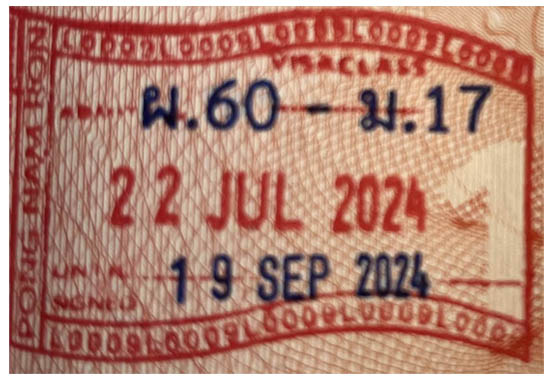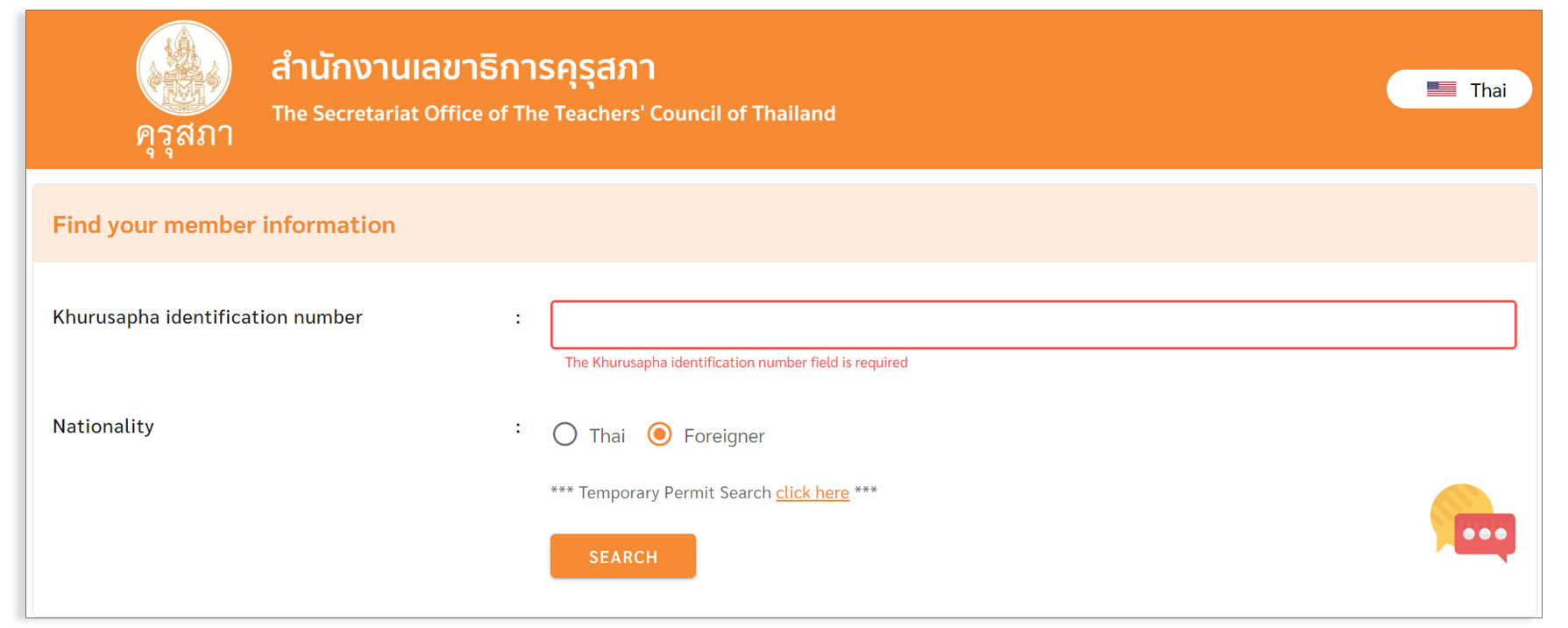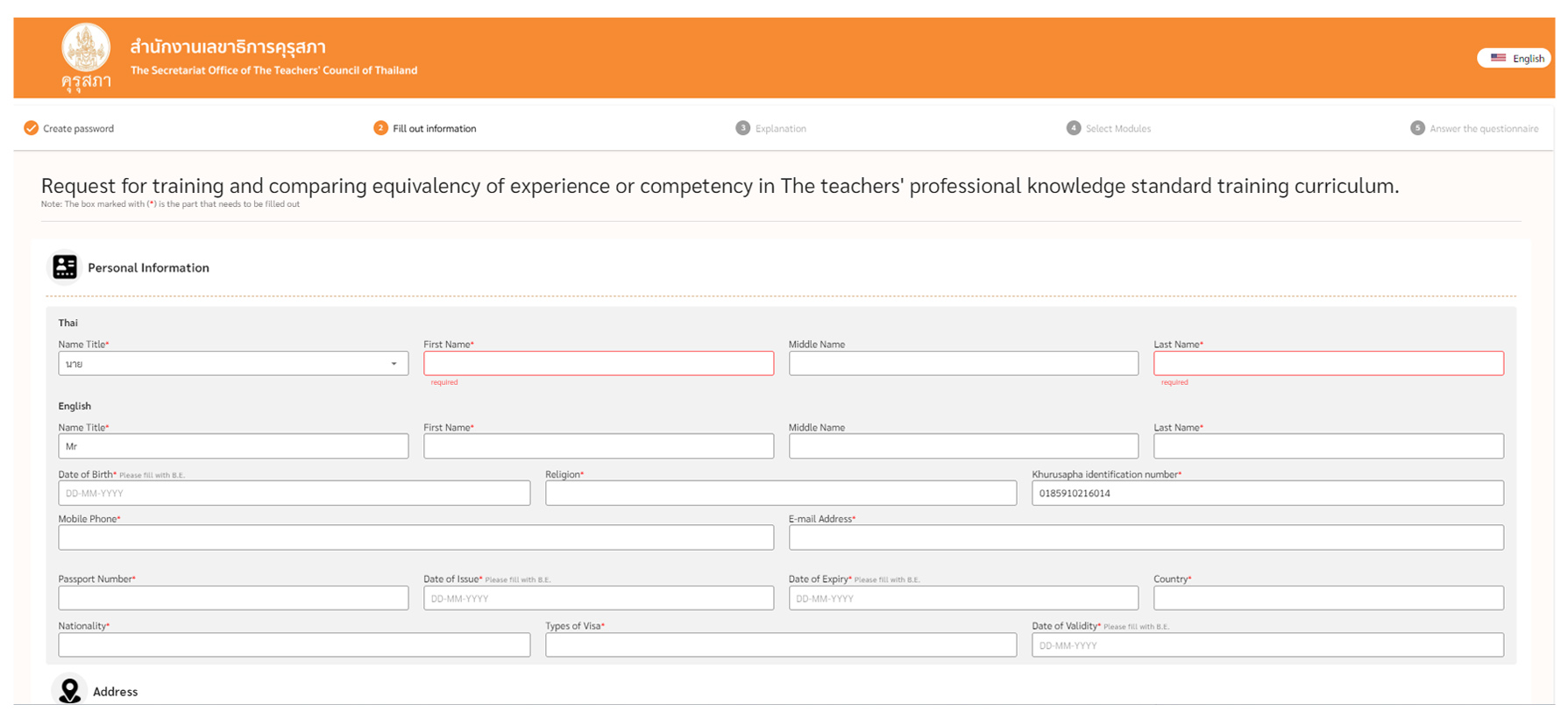Process for Obtaining a Thai Tourist Visa, Non-B Visa and Work Permit
The User Friendly Way
Updated: 2 April 2025
Welcome to our comprehensive Thai Visa Application Guide, designed to navigate you through the intricate Thailand Work Permit Process with ease. Updated regularly to reflect the latest changes, this guide is your go-to resource for all things related to obtaining a Non-B Visa in Thailand. Whether you are planning to teach, work, or extend your stay in the Land of Smiles, our step-by-step approach ensures you are well-informed and prepared for every part of the application process. Read our detailed guide to make your Thai visa process as smooth and straightforward as possible
Please read the information below very carefully and follow all the details on the page. Remember that it is your responsibility to supply us with all the necessary signed documents and needed photocopies.
If you would like to teach after completing your Essential TEFL course you will need to follow this step-by-step guide to obtain your Non-Immigrant (Non-B) Visa and your Work Permit. Carefully read and follow each step as best you can. Remember, we are always here to help.
Following this guide, and with our assistance, you will be able to start working, get settled, and avoid any problems the first time. If any of these steps or processes are not followed, you would be ineligible to work in the Kingdom of Thailand. No school in Thailand is permitted to support ineligible applicants for working visas and permits.
Interested in teaching in Thailand? Check out our TEFL Jobs in Thailand for guaranteed teaching job opportunities.

Essential Steps for Securing Your Non-B Visa and Work Permit in Thailand
All teachers wishing to apply for a Non-B Visa and Work Permit must notarise their bachelor’s degree certificate and then send it to the Thai Embassy in their home country for legalisation. It is highly recommended that you notarise and legalise your bachelor’s degree before travelling to Thailand. For assistance with legalising bachelor’s degree certificates issued from the UK, please visit our TEFL Legalisation Guide and receive a £9 discount by using our link.
There are companies which can complete the process for you.
These steps may vary from country to country, so please contact us to get the most up-to-date information.
How to Notarise and Legalise Your Degree in the USA for Teaching in Thailand
If you’re an American planning to teach in Thailand, you’ll need to notarise and legalise your bachelor’s degree. Follow this step-by-step guide to make sure your documents meet Thai immigration requirements for the Non B visa
Step 1: Notarisation
Start by having your degree notarised by a licensed notary public in the USA. This step certifies the authenticity of your document.
- Locate a Notary Public: Many banks, UPS stores, or local government offices provide notary services.
- Prepare Your Documents: Bring your original bachelor’s degree and a valid photo ID.
- Notary Verification: The notary will review your document, confirm your identity, and apply an official seal or stamp.
Step 2: Authentication (Apostille)
Once notarised, your degree must be authenticated by the Secretary of State in the state where it was notarised. This process involves attaching an apostille, which certifies the notarisation.
- Check Requirements: Visit your state’s Secretary of State website for instructions on obtaining an apostille, including forms and fees.
- Submit Your Application: Provide the notarised degree, completed application, and payment. Some states offer in-person services, while others require mail-in submissions.
- Receive the Apostille: The Secretary of State will attach an apostille certificate to your notarised degree.
Step 3: Legalisation by the Thai Embassy
The final step is to have your degree legalised by the Thai Embassy or Consulate in the USA. This ensures your documents are officially recognised by Thai authorities.
- Find the Relevant Embassy: Locate the Thai Embassy or Consulate responsible for your state. Check their official website for details.
- Prepare Your Documents:
- Your degree certificate with the apostille attached.
- A copy of your passport.
- Any additional forms required by the embassy or consulate.
- Submit Your Application: Submit the documents in person or by mail, along with the required fees.
- Processing Time: Processing typically takes 1–2 weeks. Plan ahead to avoid delays.
What if My Name Doesn’t Match the Full Name in My Passport?
Your name on your degree certificate, especially your middle name, must match the full name in your passport for visa and work permit applications. There are a couple of ways to resolve this issue: one is to get a lawyer to notarise a letter stating the name difference and the passport with the degree, which must be legalised at the Thai Embassy; or request a letter from your university.
Original Documents to Bring to Thailand
- Notarised and Legalised Degree Certificate, make sure your bachelor's degree certificate is properly notarised and legalised for visa and work permit applications.
- Original Transcript, these do not need to be notarised and legalised.
- Valid Passport, check that your passport is valid for the duration of your stay and meets all entry requirements.
Process for Obtaining a Thai Visa
Essential Educational Staffing has to apply for your Teachers License before the process of obtaining your Non-Immigrant (Non-B) Visa commences. It is important that you have original certificates of all your qualifications so that Essential Educational Staffing can complete all required documentation in a timely manner. This normally takes around two (2) weeks to be completed. You will likely need to extend your visa as outlined below.
- Carefully follow and complete all the document requirements that you will receive from us at Essential Educational Staffing.
- You will need to obtain a Visa on arrival at the airport that allows you to remain in Thailand for thirty (60) days.
- You must have at least fifteen (15) days remaining on your Visa when applying for a Non-Immigrant (Non-B) Visa.
- You can apply for an extension of thirty (30) days at Immigration in Bangkok at a cost of 1,900 Baht. This Visa can be extended for a thirty (30) day period only once. Or, depending on your nationality, you can go to Laos and apply for a 60 day visa at the Thai Embassy there. This visa can be extended for a 30 day period only once.

For a detailed step-by-step guide, please visit our Visa and Work Permit Preparation Guide.
We understand that this process might seem extensive and daunting but it is the only way to complete the paperwork correctly and legally. Following this guide, and with our assistance, you will be able to start working, get settled and avoid any problems the first time. If any of these steps or processes are not followed, you would be ineligible to work in the Kingdom of Thailand. No school in Thailand is permitted to support ineligible applicants for working visas and permits.
Finally, as mentioned before, we are here to assist you. If you have any doubts, please contact us so we can clarify any questions or concerns you might have. Try not to read the many versions of what online ‘netizens’ say or write. We only employ and assist eligible applicants, there is no other legal way. The key to avoiding disappointment is preparation.
Interested in teaching in Thailand? Check out our TEFL Jobs in Thailand for guaranteed teaching job opportunities.
Thai Visa Run Options
Sometimes it may be necessary for you to leave the country during this process. The best nearby countries to go to are Singapore or Malaysia, as they both offer free visas on arrival. All other neighboring countries require a visa fee. Same-day returns are a good idea, but make sure that you give yourself at least four (4) hours between flights.
Find out what it's like Living in Bangkok, including cultural, social, and practical tips.
Flights can be booked at one of the following:
The best airlines to use are:
- Airasia (you can book online and pay at 7/11 and many other sites)
- Nokair (you can book online and pay at 7/11 and many other sites)
Both airlines use Don Muang International Airport Terminal 1.
Find out what it's like Living in Bangkok, including cultural, social, and practical tips.
What about a re-entry permit if I want to leave Thailand during my holidays and return?
Below are the instructions needed regarding the purchasing of a Re-Entry Permit at the airport.
- You will need to check in for your flight.
- You will then need to enter passport control.
- The Re-Entry Permit Desk is located in this area.
- Please check with immigration staff before entering.
You will need the following documents:
- A passport size recent photograph. (recent means within the last 2 or 3 months)
- If you have a departure card, makke one photocopy
- One photocopy of the photograph page of your passport.
- One photocopy of your current visa.
- Fee for a Single Re-Entry Permit in 1,000 Baht (Multiple Re-Entry Permit is 3,800 Baht).
- Every photocopy must be signed in BLUE pen.
We would highly recommend that your Re-entry Permit application is completed and obtained at Immigration well before your flight and that obtaining it at the airport is done as a last resort. If you do not get a re-entry permit you could be disallowed from leaving the country until you have either a valid re-entry permit or you have cancelled your current visa. Both of these will take time and planning. Without following the rules, it could mean you miss your flight or incur greater costs than you expected. You are responsible for these costs.
90 Day Report
Where to do your 90 Day Report in Bangkok?
All foreigners living in Thailand need to report their address to the local Immigration Office every 90 days they are in the country. This can be done by visiting your local immigration office in person, by post, or online.
In person:
Your first 90 day report must be completed in person, after that you should be able to continue reporting online.
In person, your 90 day reports can only be processed at Chaeng Wattana Immigration Office.
You need to have your:
- Passport
- Work Permit
- TM 30
- Signed black and white photocopies of your Non-B Visa, Non-O Visa, and the information page of your passport.
- One copy of your Work Permit.
- Your TM30 should be up to date after your last trip abroad. Make sure you have a signed copy of the TM30 for submission.
- Completed form TM47
- Your notification receipt
Google Map to Chaeng Wattana Immigration
Online 90 Day Report
Thai Immigration Online Services
The new 90 Day Report site seems to be working. Give it a try well before the due date. If it’s your first time to report, you must report in-person.
Unfortunately, if it isn’t working there is nothing we can do. It will not be accepted as an excuse for overstay.
Note that you will have to use Internet Explorer web browser on a PC or notebook.
You will need to following:
- Passport
- Photo page
- Current visa
- Last extension of stay
- Last entry stamp
- Flight No
Comprehensive Registration Guide for the 7-Module Teacher Training Curriculum
If you're looking to register for the essential 7-module training curriculum, start by using your passport number to obtain your official ID number. This ID is crucial for completing the registration process smoothly.
Step 1: Get Your khurusapha ID Number
- Open this link to the Khurusapha ID search page in Google Chrome to translate the page to English.
- Enter your passport number and select all checkboxes.
- The first number displayed is your khurusapha ID number, essential for completing your registration.
Step 2: Register on the Secretariat of the Teachers Council Website
Once you've secured your ID number, register on the official Khurusapha website for teacher qualification processing at this registration page.

Step 3: Complete Your Online Registration
Follow the outlined steps on the portal to complete your online registration for the 7-module teacher training curriculum.

Step 4: Get Support for Registration
If you experience issues during the registration process or need further guidance, contact [email protected] for personalized assistance.
Step 5: Download the One Platform
Please scan the QR Code below and download the One Platform app on your device.

Step 6: Sign into the One Platform
To sign into the app, click **Username** and enter your **Khurusapha identification number** as your username, then enter your password.
For detailed information on signing up for the 7 modules and step-by-step guides, visit our Official Teacher Training Registration Guide.
Frequently Asked Visa Questions
Explore our updated FAQ for insights on Thai visas, work permits, and TEFL life in Thailand.
What documents are essential for a Thai Visa application?
Thai immigration mandates a notarized and legalized original degree certificate for Non-B visa applications
How can I find accommodation in Bangkok?
Discover various accommodation options in Bangkok suitable for teachers and students on our Accommodation in Bangkok page.
How long will it take to get my Non B visa and Thai Work Permit
If you have your completed documents ready as listed above, it can take two weeks to get the Non-B visa and about a month to obtain the Thai Work Permit
Can I apply for a Thai visa when I arrive at the airport in Thailand?
Absolutely! The 30 Day Visa on Arrival procedure is streamlined and will be completed as soon as you land in Thailand.
How much money should I bring with me?
We suggest participants bring enough money to live on for several months. A suggested amount is between 100,000-150,000THB. This amount will allow you to find accommodation (deposit for an apartment is usually two months’ rent) and cover day-to-day living expenses until you finish the program and secure a job. While Thailand is not an expensive place to live, forward planning is essential. In addition, most schools pay salaries at the end of the month, so you could be working for several weeks before you get paid. It is also a good idea to have some “emergency” money set aside for unexpected occurrences.
How much are TEFL teachers paid in Thailand?
This really depends on the job and school. However, because of the demand for qualified English teachers throughout the country, English teacher salaries allow for a comfortable lifestyle.
Can I speak English with people in Thailand?
Of course. Thai people have a basic level of English, especially in Bangkok. Having more detailed conversations can be a challenge though but that is half the fun of living in a new country. Thai people are extremely accommodating and helpful, so you should not worry about any language barrier being too much of a problem. As part of the course, we will teach you some key Thai words and phrases to assist you with your day-to-day activities.
Is there a good network of expats in Bangkok?
Yes, Bangkok has attracted people from across the world and it is easy to make friends and find people with similar interests. Part of the Essential TEFL program is connecting participants with current teachers and others who live and work in Bangkok so that you will begin making connections the moment you arrive.


